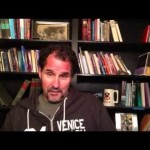We run our website the way we wished the whole internet worked: we provide high quality original content with no ads. We are funded solely by your direct support. Please consider supporting this project.
How Are We To Love the Soldiers of ISIS?
Over the last several weeks I’ve received some form of this question almost every day. In some cases the question is asked rhetorically, as though the very question exposes the absurdity of suggesting we are to love this terroristic group. Other times the question is asked with a pragmatic twist. One person recently said to me: “If everyone just laid down their arms and loved ISIS, America would before long be under their barbaric rule. Is that what you really want?” I assured him that it was not.
To begin, it’s first important to remember that the teaching of Jesus, Paul and the rest of the New Testament about never retaliating and about instead choosing to love, bless, pray for, and do good to our enemies is emphatic, unambiguous, and never once qualified (e.g. Mt 5:21-6, 38-48; Lk 6:27-36; Rom 12:14-21). Indeed, Jesus goes so far as to make our willingness to unconditionally love enemies the pre-condition for being considered a “child of your Father in heaven” (Mt 5:44-5; Lk 6:35-6). While this radical mandate may violate our core intuitions about justified violence, and while it certainly flies in the face of many people’s pragmatic concerns, if we confess Jesus as Lord, I submit that this simply means there must be something amiss with our intuitions and pragmatic concerns. If Jesus is in fact Lord, faithfulness to his teaching and example must trump all other considerations. Otherwise we must face Jesus’ pointed question: “Why do you call me, ‘Lord, Lord,’ and do not do what I say” (Lk 6:46)?
Second, it’s important to note that the pragmatic concern about what would happen if everyone obeyed Jesus and therefore loved ISIS is a Christendom-type concern, for it presupposes that part of the job of Christians is to run the world. While it may sound irresponsible to the world’s pragmatists, the sole concern for Jesus followers is to be faithful citizens and ambassadors of the kingdom of God. It was precisely when the church of the fourth century embraced the pragmatic concern that it compromised the concern for faithfulness by setting down the cross and picking up the sword.
Not only this, but kingdom people need to notice that most of the world’s violence—including violence carried out “in Jesus name” throughout history—has been the result of people trying to more effectively run the world. Believing they had superior ideas about how best to rule, nations and religions have felt justified killing any who oppose them. To my mind, this simply bears witness to the fact that humans were created to be under the Lordship of their Creator, not under the lordship of other humans.
When people place their trust in human rulers, it is tantamount to rejecting God (see I Sam 8) and things invariably go bad. Kingdom people are called to bear witness to God’s original design by pledging our sole allegiance to Jesus Christ and to trust him to oversee the world. This singular devotion to Christ is what empowers us to “leave all vengeance to God” and instead love and serve our enemies (Rom.12:19-21).
It’s also relevant to people’s pragmatic concerns that, immediately after telling Jesus’ followers to “leave all vengeance to God,” Paul goes on to specify that one of the ways God exacts “vengeance” and punishes wrongdoers is by using sword-wielding governments (Rom. 13:1-6). In other words, Paul forbade kingdom people to do the very thing he assumes governments are willing to do: namely, wielding the sword. So too, Paul instructs kingdom people to leave to God the very thing that God uses governments to accomplish: namely, wielding the sword to exact vengeance on wrongdoers.
In this light, there is no need for Jesus followers to worry about what would happen if “everyone put down their weapons and loved ISIS.” The number of those willing to actually follow Jesus’ teachings and example has, unfortunately, always been relatively small, even among professing Christians. And, as Jacque Ellul so profoundly argued in is book, Violence: Reflections From A Christian Perspective, as long as there are nations and governments, there will be people who are more than willing to engage in violence, for no national government can rule its people and survive outside threats without being willing to engage in violence. Nations, governments and violence go hand-in-hand, in other words. The call of kingdom people is to opt out of this whole enterprise by pledging allegiance to Christ alone as we leave all vengeance to God and simply imitate Christ by loving our enemies (Eph 5:1-2).
With this background in place, we are in a position to notice something important about the question: How are we to love the soldiers of ISIS? The only reason this question is different from the question of how we are to love anybody else is that these people strike us as more evil than others and/or because we may be concerned about what would happen if everybody loved these soldiers. But as we’ve just seen, our call to love has nothing to do with how “good” or “evil” a person is. We’re to love “the righteous” and the “wicked,” just like the rain falls and the sun shines (Mt 5:44-45). And we’ve seen that the pragmatic concern is not part of kingdom call and is, in any case, completely unfounded. Hence, we can see that, if we’re thinking like kingdom people, the question of how we are to love the soldiers of ISIS is no different than the question of how we are to love anybody else. On that note, I’ll conclude by stating two aspects of how we are to love all people, including the soldiers of ISIS.
First, we are love the soldiers of ISIS, as we do all others, by agreeing with God that each of these soldiers has unsurpassable worth as evidenced by God’s willingness to pay an unsurpassable price for them. As God did for us and all people on Calvary, we are to ascribe unsurpassable worth to these soldiers at cost to ourselves. For most of us, the “cost to ourselves” will simply be whatever difficulty we confront as we push past our judgments, our intuitions about justified violence, and our pragmatic concerns in order to bring our hearts in line with God’s assessment of their worth on Calvary. However, for people who are directly affected by the barbarism of ISIS or who feel called to engage them as peacemakers, the cost of refusing violence and loving enemies may unfortunately be much greater. They may lose their lives, just as Jesus did. Yet, doing so does not signify defeat for the kingdom person, for if done in love, this is precisely how kingdom people overcome (see e.g. Rev. 12:11).
Second, we can love the soldiers of ISIS by praying for them and their families. Among our prayers should be prayers of blessing for their families as well as prayers for the soldiers’ deliverance. We understand that our real enemy, and their real enemy, is not “flesh and blood”: they are rather the “principalities and powers” that imprison humans in lies, hate, vengeance, the lust for power and, therefore, violence (Eph 6:12). As Origen told the pagan Celsus who accused second century Christians of being unpatriotic because of their unwillingness to fight, for all we know, the prayer we offer on behalf of our enemies does more to bring peace to our nation than killing ever could (Contra Celsus). And while killing enemies is inconsistent with expressing Calvary-like love toward them, praying for them both expresses and applies it.
Category: Q&A
Tags: Enemy Love, ISIS, Jesus, Kingdom Living, Love Your Enemies, Non-Violence, Sacrifice
Topics: Enemy-Loving Non-Violence, Ethical, Cultural and Political Issues
Related Reading

Washing Osama’s Feet – blog post 8/28/07
(This post was written by Greg on Sunday, October 28, 2007. It was such a controversial entry that he had to write a follow-up post which you can read here) Brad Cole is a friend of mine who runs a ministry called Heavenly Sanctuary. This ministry puts on Conferences around the country on the Character…

Video Q&A: Do you think Jehovah’s Witnesses and Mormons are saved?
Does Greg believe that everyone goes to Heaven regardless of their beliefs? Find out here.

How should Christians respond to Near Death Experiences?
In a recent Q and A session about the book of Revelation, Greg Boyd and Paul Eddy answer a question on How Christians should respond to claims of Near Death Experiences. You can view the entire Q and A HERE.

What Makes the Good News So Good
While God was revealed in various ways and to various degrees through the law and the prophets of the Old Testament, in Jesus we finally have the one who is “the exact representation of God’s being” or essence (hypostasis, Heb. 1:1-13). This is the heart of the Good News that reverberates throughout the New Testament.…

Peaceworks
We’re excited about an upcoming video series by Peaceworks, a new youth movement for peace. It will inspire you and give you the tools you need to make a difference in your life and the world. Watch the trailer to find out who the speakers will be (spoiler alert: one of them is Greg) or visit…

Violence: What Did Jesus Do?
Thomas Quine via Compfight Here’s a spot-on reflection on what Jesus taught us about responding to violence. Whatever you think about the justification of violence in particular situations, as Christians we simply cannot escape the fact that Jesus demonstrated another way. From the reflection: And though he had access to unlimited power to have himself released…

